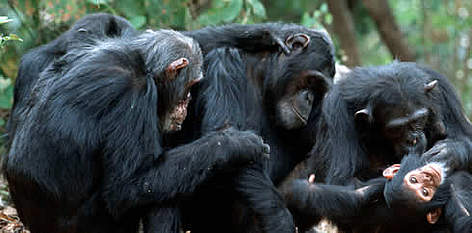By Nicholas St. Fleur, The New York Times, June 12, 2015
All chimpanzees will be designated as endangered under the Endangered Species Act, the United States Fish and Wildlife Service announced Friday.
The move follows a petition filed in 2010 by Jane Goodall, The Humane Society of the United States and other groups to eliminate a longstanding distinction between the legal status of captive chimpanzees, which were previously listed as “threatened,” and their wild counterparts, which have been deemed “endangered” for decades.
With the new designations, chimpanzees held in captivity in the United States will receive the same protections as wild chimps under the Endangered Species Act. Biomedical research, interstate trade, and export and import of captive chimpanzees will now require permits issued by the Fish and Wildlife Service. The new rules will become official on June 16 and will go into effect after a 90-day grace period on Sept. 14.
The regulations do not require that people who privately own chimpanzees obtain a permit to keep them, nor do they require permits to use chimpanzees in the entertainment industry, according to Dan Ashe, the United States Fish and Wildlife Service’s director. He said that the previous distinctions sent a mixed signal to the public and created the impression that chimpanzees were not in dire need of help.
“At the time we thought it was important to encourage breeding of captive chimps to expand their numbers,” said Mr. Ashe. “But we expanded a culture of treating these animals as a commodity for research, sale, import and export, and entertainment. That has undermined the conservation of chimpanzees in the wild.”
Chimpanzees once numbered about a million in the early 1900s, but widespread habitat loss and poaching have caused their numbers to decline. Currently, there are estimated to be between 172,000 and 300,000 worldwide, according to the Jane Goodall Institute.
The changes will create barriers to biomedical research, according to Mr. Ashe. There are 730 chimpanzees in the custody of biomedical laboratories, according to chimpcare.org, and the changes require that any research that might harm or harass chimpanzees requires a permit.
Scientists will also need a permit to sell chimpanzee blood or tissue across state borders. In order to obtain a permit, biomedical researchers must “demonstrate that their research would be directly and substantially supporting the conservation of chimpanzees in the wild,” Mr. Ashe said.
That could include making donations to chimpanzee conservation efforts, he said. “It’s a substantial burden; it’s not just a matter of writing a check,” said Mr. Ashe.
Wayne Pacelle, chief executive of The Humane Society, said that the announcement, paired with an initiative by the National Institutes of Health in 2013 to retire government-owned chimpanzees from labs to sanctuaries, creates “an incredible one-two punch for chimpanzee conservation.”
“This rule change will help put an end to the exploitation of chimpanzees and we are happy about that,” said Erika Fleury of the North American Primate Sanctuary Alliance, a group of eight primate sanctuaries in the United States and Canada that cares for close to 600 chimpanzees and monkeys.
She cautioned that if the changes result in more chimpanzees retiring to sanctuaries, they should be accompanied by more funding for sanctuaries. “This is a big step,” she said. “It’s years in the making and we’re very happy to see this come to fruition.”

No comments:
Post a Comment